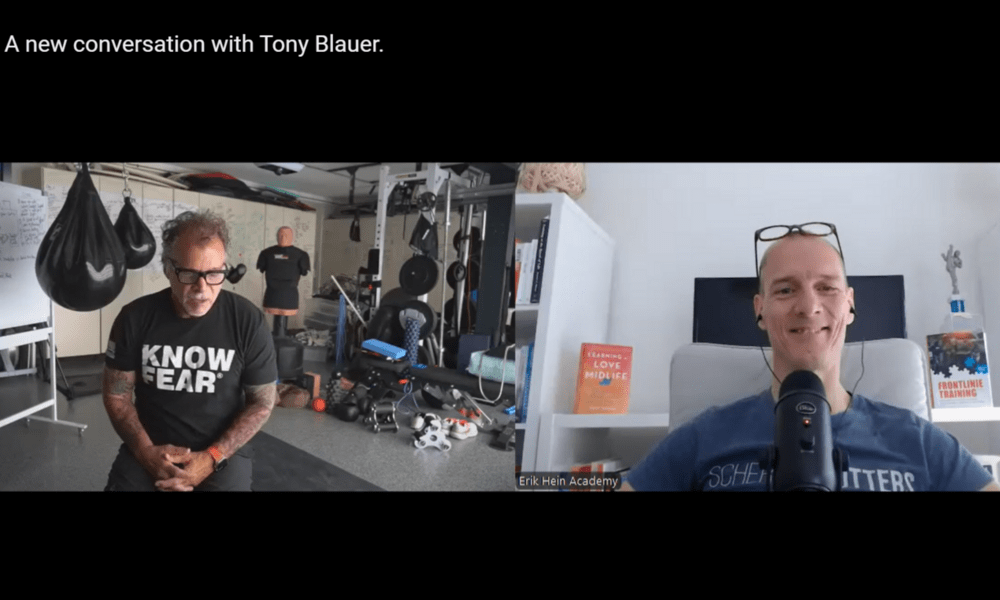I hope you’re enjoying some downtime during the holidays. Instead of diving into work over the break, I’m taking this opportunity to recharge and reflect – something I recommend to anyone who’s constantly on the go. Over the holiday break, I want to share a couple conversations I had as a guest on podcasts. These talks are packed with strategies and insights that can help you in both personal and professional life.
One of my favorite conversations was with Erik Hein. We dug into some of the most important topics in self-defense, including scenario training, tactical fitness, and the powerful link between situational awareness and intuition. Erik’s curiosity and thoughtful questions made this episode special, and I’m honored to share his reflections with you.
I hope you find some gold in it to carry with you into the new year.
Wishing you all the best,
Coach Blauer
 Below is Erik Hein’s unedited post:
Below is Erik Hein’s unedited post:
Tony Blauer is a true pioneer in reality and evidence-based self-defence and LEO/MIL training. In this second episode we talk about 3 topics, namely Tony’s Life and Career (His journey, mission, and evolution over decades), Scenario Training (The importance of realistic, evidence-based training) and Tactical Fitness (Incorporating readiness into everyday life). We also talk about the concept of an energetic pre-contact cue, describing it as a physiological and intuitive signal that precedes physical violence. He mentions that victims often report having a “bad feeling” before an attack, which reminds me of polyvagal to neuroception or the body’s ability to sense danger subconsciously. He connects this to his teachings on situational awareness and readiness.
My questions for Tony:
“For the younger generation, how would you best introduce yourself?”
“What was the main finding of the Sucker Punch experiment?”
“Can you explain more about the startle response and its impact?”
“Why is managing fear so important in violent encounters?”
“Can you explain the difference between the psychology and biology of fear?”
“What are energetic pre-contact cues, and how are they used in training?”
“Have you changed as a person or in your mission over the years?”
“What are the main shortcomings of current police scenario training?”
“What do you mean by reverse engineering and replication in scenarios?”
“What are tactical snacks, and how can they help with fitness?”
“What specific exercises can police officers do during long shifts?”
“How do you deal with professional setbacks and criticism?”
“How do you come up with such effective acronyms for your programs?”
Quotes from Tony from the podcast
“If we change our relationship with fear, we can change our mind in real time.”
“Fear is the static you feel before the actual event; it’s the precursor to action.”
“We need to self-regulate during a violent encounter, and that starts with our inner dialogue.”
“I’ve always been about making people safer, but now I focus on simplifying and distilling what works best.”
“If I could monetize my haters, I’d be retired by now.”
Tony explains the Three R’s as foundational for scenario training: “Realistic ensures authenticity, relevant ensures applicability, and rigorous ensures intensity.”
“All fights are dangerous, but the most dangerous is an ambush because it hijacks executive function.”
“The bad guy controls the fight – their actions dictate the location, level, and duration of violence.”
Tony describes tactical snacks as brief, practical exercises integrated into daily activities: “It’s like compound interest for your fitness – small, consistent actions add up over time.”
=====
Become a Survival Dispatch Insider …
We bring together survival enthusiasts and preppers to share skills and knowledge, so you can enhance your preparedness for emergencies and ensure the safety of you and your community.
The Results You’ll Get …
Our community, courses, and memberships are pretty special. We focus on the ways it will make a huge difference in your life.
Here are a few of the things you’ll be able to do as a member of Survival Dispatch Insider …
1) Improve your emergency preparedness by learning survival skills and strategies from experienced preppers.
2) Build lasting connections with like-minded individuals that share your passion for safety and readiness.
3) Access a wealth of knowledge and resources to assist in protecting you and your community during unexpected situations.
Click HERE to get started.
=====
